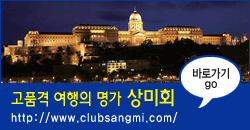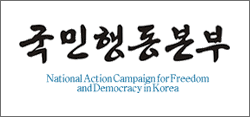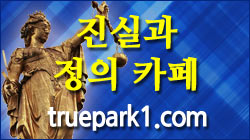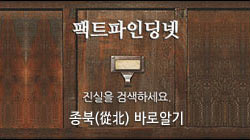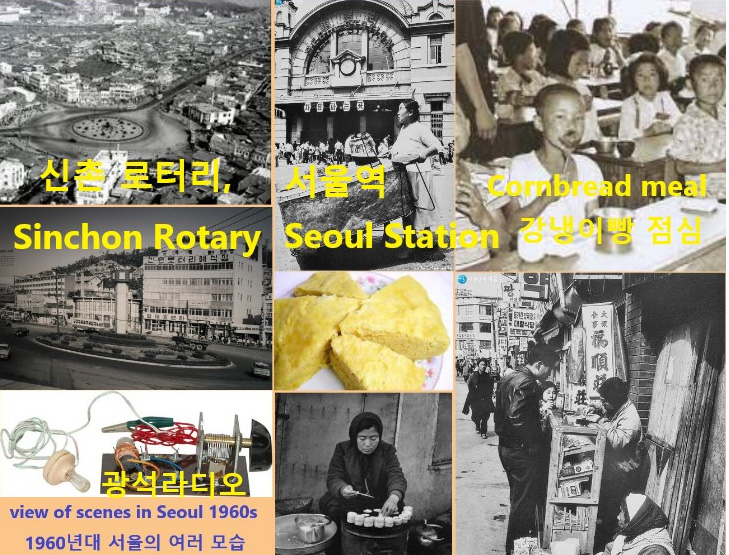 |
60년대: 4·19와 5·16이 있었다.당시 나는 서대문 사거리에 있었다. 주변에서 엄청난 인파와 구호(口號)를 잠시나마 직접 보고 들었다. 우연의 일치였다. 아직 정치(政治)가 뭔지 알 리가 없었다. 그보다는 나도 보통사람들처럼 신촌과 마포의 지저분하고 어수선한 환경에다 심심찮게 발생하는 불량배들의 행패와 싸움에 더 민감(敏感)했다.
양대사건(兩大事件), 4·19 혁명(1960)과 5·16 혁명(1961)은 하루 앞을 내다볼 수 없는 그런 상황에서 연속(連續) 일어났다. 신촌 로터리, 아현동 고개, 염천교와 서울역 주변엔 부랑아(浮浪兒)와 노숙자(露宿者) 그리고 지게꾼들로 북적댔다. 풀빵, 막국수, 노란색의 큼직한 옥수수빵을 파는 노점상들이 거리마다 즐비했다. 하지만 그림의 떡이었다.
(참고;1945년 8·15 광복 후, 미국의 원조는 계속됐다. 절대 필요했던 시기였다. 초등학교에서는 노란색의 옥수수빵 한 조각을 받아먹으려고 줄을 서기도 했다. 물에 분유(粉乳)를 타 만든 우유(지방을 뺀 것이어서 쌀뜨물 맛임)를 조그만 양은 종바리에 담아 주면 그것으로 점심을 때웠다. 그것도 이틀에 한 번 정도였다. 강냉이가루로 만든 한 조각의 빵과 쌀뜨물 맛 같은 우유 한 종바리가 얼마나 귀하고 소중했는가를 알 수 있다. 이를 잊지 못해 아직도 우유 한 방울도 밥알 하나도 함부로 버리지 못한다. 찐 달걀도 일 년에 한두 번 소풍 갈 때, 그것도 운이 좋아야 먹었다. 대개 선생님에게 드렸거나 애들과 함께 나눠 먹었으니까.)
당시 신촌 등 큰 도로 주변엔 항상 불안감이 존재했다. 공포의 대상 중 하나로 넝마주이를 들 수 있다. 그들을 피해 다녔다. 그들은 등에 큰 망태를 메고 거리나 동네를 돌면서 휴지 깡통 등 오늘날의 폐품수거(廢品收去)를 해서 생계(生計)를 이었다. 문제는 이들 중 일부는 쇠꼬챙이(갈고리)를 들고 다니며 사람들을 위협(威脅)하며 껌이나 알사탕 등을 내밀며 살 것을 강요했다는 것. 이들 가운데에는 국가를 위해 목숨 바쳐 싸운 상이군경(傷痍軍警) 등 진짜 국가유공자들도 많았다. 이들의 특징은 의수(義手-쇠갈고리)를 착용했다는 것.
아마도 당시엔 국가(國家)가 이분들에게 마땅히 지급해야 할 보훈급여금(報勳給與金)조차도 없었던 모양이다. 당시 大韓民國은 세계 최빈국(最貧國, 1인당 국민소득 79불) 가운데 하나였다. 기억해둘 필요가 있다. (참고; 당시 북한은 물론 방글라데시, 페루, 필리핀, 태국, 콜롬비아, 터키 우간다 짐바브웨 등 대부분이 한국보다 훨씬 더 잘 살았다. 그러나 불과 20~30년 후, 내가 이들 나라에 갔을 땐 완전히 역전(逆轉), 즉 우리보다 몇 배 못 살았다. 격세지감(隔世之感)! 경천동지(驚天動地)! 그 자체였다.
그런데 어느 날 동네와 거리엔 놀라운 변화가 일어나기 시작했다. 그 많던 거지와 넝마주이들이 감쪽같이 사라졌다. 동네 구석구석엔 소규모(小規模)의 가내공업(家內工業)이 들어서기 시작했다. 가발공장, 요꼬(스웨터 편직기)공장, 철공소, 비닐 인형공장, 액세서리(반지,목걸이)공장, 과자(꽈배기) 공장, 자개 공예품 공장, 목각토산품 공장, 건전지 공장, 토끼고기 분류하는 공장, 난로, 풍로 제작공장, 봉제공장, 브라자공장 등.
이런 큰 변화에 이어 당시 매일 볼 수 있었던 것들, 눈에 익숙한 또 다른 장면들이 빠르게 사라지기 시작했다. 즉, 신촌 로터리와 큰길가에는 물론 동네 골목을 돌아다니며 “구두 따~꺼어”, “아~이스~케끼”를 목이 터지도록 외치고 다니던 아이들, 갑자기 비가 오면 얼른 아이스케이크 통 대신에 비닐우산을 한 아름 안고 뛰어다니며 팔던 아이들, 신문 더미를 가슴에 안고 다니며 팔던 아이들의 모습, 이런 다이나믹한 광경(光景) 등이 사라졌다(소위 말하던 삼순이 중 공순이 외, 식순이 차순이도 대부분 사라짐).
그 뒤 나를 포함한 애들은 다들 공장으로 갔다. 의젓한(?) 직장인, 공돌이 시대가 열린 것이다. 장족(長足)의 발전! 희망의 씨앗, 꿈의 세계는 이렇게 싹트기 시작했다. 이 같은 변화는 마치 석화광음(石火光陰)처럼 눈 깜빡할 사이에 나타났다.
(*세계에는 여전히 구두닦이통을 들고 다니는 이들과 무거운 아이스케키 통을 메고 다니며 얼음과자를 파는 이들이 아직 많다. 그러나 대부분 내 어린 시절처럼 가난의 산물(產物)이니 크게 이상할 게 없었다. 예외가 있다. 그리스. 베네수엘라. 아르헨티나. 아르헨티나의 경우, 한때 세계 5대 부국이었다. 1960년대 일본보다 더 잘 살았다. 남미의 파리로 불렸다. 부에노스아이레스에서 이들을 볼 땐 먼저 사악(邪惡)한 정치꾼들이 떠올랐다. 이들의 공통점은 거짓말과 선동으로 마구 퍼먹고 퍼주면서 국고를 거덜낸다는 것. 결국, 온 국민을 거지로 만들고 나라를 망친다는 것이다.)
60년대 중반까지, T.V가 거의 없던 시절(최초의 국산 TV, 1966)이었다. 사실 라디오도 흔치 않던 시대다. 진공관 라디오는 비싸서 못 샀다. 당시 신촌 로터리 골목에는 중고 라디오 부속품을 파는 곳이 있었다. 바리콘 등 부속품 몇 개를 구입해 겨우 소리만 낼 수 있는 광석(鑛石) 라디오를 직접 만들었다. 안테나 없이도 구리선만 길게 벽에 걸어놓으면 소리가 났다. 신기하고 행복했다.
물론 그때에도 소수(小數)의 상대적(相對的) 부자(富者)는 있었다. T.V가 있는 집이 있었다. 박치기의 왕(王), 김일(金一) 선수가 나오는 레슬링 경기가 있는 날엔 동네 아이들이 그 부잣집 앞마당에 다 모였다. 주인(主人)의 배려(配慮)로 T.V를 현관(玄關) 앞에 내놓았기 때문이다(이와 매우 비슷한 광경을 미얀마에서(1995), 인도(1994)에서 봄). 김일이 통쾌(痛快)한 박치기를 선보일 때마다 환호와 박수가 터져 나왔다. 지축(地軸)을 흔들었다.
당시의 행복의 질(質)로 본다면 단연 압권(壓卷)이었다. 정말 신나고 행복한 순간이었다. 이처럼 절대적 빈곤 속에서도 최고의 기쁨과 행복을 맛보았는데, 오늘날 풍요 속에서야 오죽하랴. *천양지차(天壤之差)에 감지덕지(感之德之)할 수밖에!! (3부 계속)
The most blessed story of my life (2)
Early 1960s: Gwanghwamun, Seoul, witnessed the 4.19 and 5.16 Revolutions. I was in the Seodaemun Intersection at the time. For a moment, I could see and hear the massive people and shouts surrounding me. It was purely coincidental. I still didn't understand what politics were. Rather, I was more sensitive to the rumblings and fights of gangsters that frequently happened in the filthy and congested settings of Sinchon and Mapo near Sogang University, as were most others.
The two great events, the April 19th Revolution (1960) and the May 16th Revolution (1961), occurred in such a way that the future could not be predicted. It was filled with street children, homeless people, and porters around Sinchon Rotary and Seoul Station. The streets were crowded with street vendors offering barley bread, noodles, and huge yellow cornbread. However, it was a piece of cake.
Note: Following the liberation on August 15, 1945, the United States continued to provide assistance. Students lined up at elementary schools to get and eat a piece of yellow cornbread. I created milk in a tiny cup by combining powdered milk and water (without fat; it tastes like rice water), and I used it to make lunch. That happened roughly every two days. I know how valuable these things were to me. So I still don't waste a drop of milk or a grain of rice. (I was fortunate to be able to have steamed eggs once or twice a year on picnics since I generally donated them to teachers or shared them with the friends.)
Anxiety was usually present along key streets at the time, such as Sinchon near Sogang University. Scavengers were one of the things that people fear. I've been trying to avoid them. They made a living by going about the streets and neighborhoods with enormous nets on their backs, collecting rubbish like empty bottles and cans. Some of them were armed with iron skewers (hooks), frightened people, and forced them to buy gum or sweets. Among them were many actual national heroes, such as injured soldiers and police officers who gave their lives in the service of their country. They were distinguished by the fact that they had artificial hands.
Perhaps, in my judgment, the state did not even have the veterans' benefits that these folks should have received at the time. The Republic of Korea was one of the poorest countries in the world at the time (per capita income of $79). (It's worth noting that, at the time, not just N. Korea but also Bangladesh, Peru, the Philippines, Thailand, Colombia, Turkey, Uganda, and Zimbabwe lived better than S. Korea.) However, when I visited these places 20 to 30 years later, the situation had entirely changed. In other words, they were a lot poorer than we were in Korea. A quite different sensation!
But then, one day, incredible things started to happen in the neighborhood and on the streets. Many beggars and ragpickers vanished. Domestic industry on a small scale began to emerge in each residential area. A wig factory, an iron factory, a vinyl doll factory, a wooden souvenir factory, a battery factory, a rabbit meat factory, a sewing factory, a bra factory, and so on.
Following this major shift, additional familiar scenes—things that could be noticed on every day at the time—began to vanish quickly. around other words, the young guys who used to roam about the neighborhood alleyways screaming "Shine your shoes" and "I sell delicious ice cream cakes" around Sinchon roundabouts and along the main highways have vanished. Such a lively scene vanished.
Everyone, including me, found a job at the factory after that. The thrilling era of manufacturing workers had begun. This was a significant step forward. It was how the seeds of hope and the world of dreams began to blossom. This transformation happened in the flash of an eye, just like being struck by lightning.
There are still many people in the globe who make a living while carrying shoeshine boxes and heavy ice cream boxes. However, the most of them, like my upbringing, were the result of poverty, so it's not surprising. There are a few exceptions. Argentina, Greece, and Venezuela. Argentina was previously one of the five richest countries in the world. They had a greater standard of living than Japan in the 1960s. They were called "Paris of S. America." When I first saw them in Buenos Aires, I immediately thought of evil politicians. It is because they spend the state money without limit on the people including themselves. In the end, they impoverish the entire population and ruin the country.
There were essentially no TVs in Korea until the mid-1960s (the first domestic TV was in 1966). In reality, there were not enough radios too. It was too pricey for me to get a vacuum tube radio. Sinchon Rotary Alley had a store selling used radio parts at the time. I bought a few parts, such as a varicon, and made my own radio, which could make sound. A long copper wire placed on the wall created sound even without an antenna. This truly astonished and delighted me.
Of course, there were a few rich people even back then. They had a TV set. On the day of the wrestling match with the head-butting king, Kim Il, the entire neighborhood gathered in front of the TV in the rich man's front yard. (I saw spots extremely similar to this in Myanmar in 1995 and India in 1994.) The yells and acclaim were so loud that the neighborhood broke every time Kim Il tried a thrilling headbutt.
This was by far the best in terms of happiness quality at the time. It was a thrilling and joyful experience for me. Even in the midst of extreme poverty, I experienced the greatest delight and satisfaction. Today, I live in incomparable life to that of the past. There can be no better expression of thankfulness for me than this. (be continued)
Thanks.












 bestkorea(회원)
bestkorea(회원)







 트위터
트위터 페이스북
페이스북 미투데이
미투데이 요즘
요즘 네이버
네이버




























